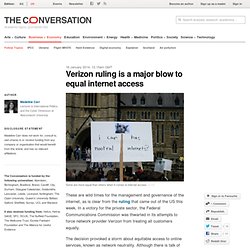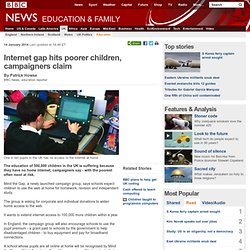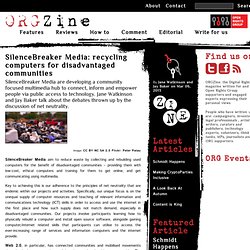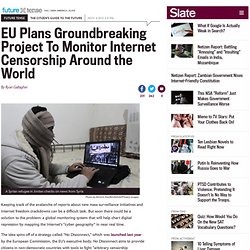

Net Neutrality [RAP NEWS 25] Verizon ruling is a major blow to equal internet access. These are wild times for the management and governance of the internet, as is clear from the ruling that came out of the US this week.

In a victory for the private sector, the Federal Communications Commission was thwarted in its attempts to force network provider Verizon from treating all customers equally. The decision provoked a storm about equitable access to online services, known as network neutrality. Although there is talk of an appeal against the Verizon ruling, this is an issue that will have significant implications for every one of us and it’s unlikely to go away.
Network neutrality is not simply a technical issue – it’s about social, economic, cultural and political preferences and consequently, it’s important to be aware of what changes are proposed and how they could affect the way we use online services. What are we fighting for? Network neutrality typically refers to the transport of these data packets without prejudice. The US is different Streaming sends us to the brink. Internet gap hits poorer children, campaigners claim. 14 January 2014Last updated at 14:48 ET By Patrick Howse BBC News, education reporter One in ten pupils in the UK has no access to the internet at home The education of 500,000 children in the UK is suffering because they have no home internet, campaigners say - with the poorest often most at risk.

Mind the Gap, a newly launched campaign group, says schools expect children to use the web at home for homework, revision and independent study. The group is asking for corporate and individual donations to widen home access to the web. It wants to extend internet access to 100,000 more children within a year. In England, the campaign group will also encourage schools to use the pupil premium - a grant paid to schools by the government to help disadvantaged children - to buy equipment and pay for broadband connections. A school whose pupils are all online at home will be recognised by Mind the Gap as "digitally inclusive", and the campaign will help schools that want to achieve the status to do so. SilenceBreaker Media: recycling computers for disadvantaged communities. SilenceBreaker Media are developing a community focused multimedia hub to connect, inform and empower people via public access to technology.

Jane Watkinson and Jay Baker talk about the debates thrown up by the discussion of net neutrality. Image: CC BY NC SA 2.0 Flickr: Peter Patau SilenceBreaker Media aim to reduce waste by collecting and rebuilding used computers for the benefit of disadvantaged communities – providing them with low-cost, ethical computers and training for them to get online, and get communicating using multimedia. Key to achieving this is our adherence to the principles of net neutrality that are endemic within our projects and activities. Specifically, our unique focus is on the unequal supply of computer resources and teaching of relevant information and communications technology (ICT) skills in order to access and use the internet in the first place and how such supply does not match demand, especially in disadvantaged communities. Net Neutrality. How the ITU could put the Internet behind closed doors. European Capability for Situation Awareness program to monitor Internet access around the world.
Photo by KHALIL MAZRAAWI/AFP/Getty Images Keeping track of the avalanche of reports about new mass surveillance initiatives and Internet freedom crackdowns can be a difficult task.

But soon there could be a solution to the problem: a global monitoring system that will help chart digital repression by mapping the Internet’s "cyber geography" in near real time. The idea spins off of a strategy called “No Disconnect,” which was launched last year by the European Commission, the EU’s executive body. No Disconnect aims to provide citizens in non-democratic countries with tools to fight “arbitrary censorship restrictions and protect against illegitimate surveillance.” It was largely inspired by the indiscriminate spying, tracking, and Web filtering exposed during the Arab Spring in countries such as Syria and Libya, sometimes assisted by Western technology firms. Now, the team behind the strategy are building what they call a “European Capability for Situational Awareness.” The Internet Defense League - Protecting the Free Internet since 2012.
The Campaign.